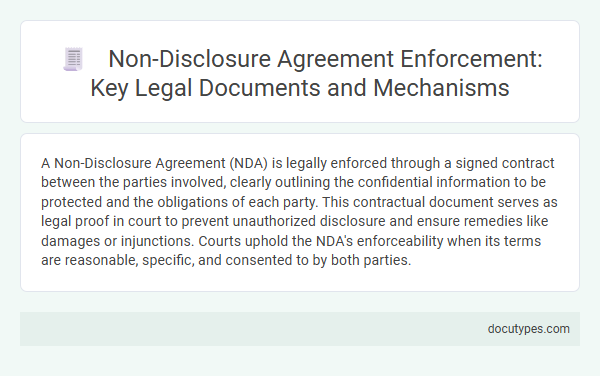A Non-Disclosure Agreement (NDA) is legally enforced through a signed contract between the parties involved, clearly outlining the confidential information to be protected and the obligations of each party. This contractual document serves as legal proof in court to prevent unauthorized disclosure and ensure remedies like damages or injunctions. Courts uphold the NDA's enforceability when its terms are reasonable, specific, and consented to by both parties.
Introduction to NDA Enforcement
Introduction to NDA Enforcement |
|
|---|---|
| Non-Disclosure Agreement (NDA) | A legally binding contract designed to protect confidential information shared between parties. |
| Enforcement Document | The NDA itself serves as the primary legal document that enforces confidentiality obligations. |
| Legal Authority | Courts recognize NDAs under contract law, enabling enforcement through legal actions in cases of breach. |
| Scope of Enforcement | Enforcement covers trade secrets, proprietary data, business strategies, and other sensitive information outlined in the NDA. |
| Judicial Remedies | Legal consequences include injunctions, monetary damages, and specific performance to prevent unauthorized disclosure. |
| Critical Elements | Clear definitions of confidential information, mutual consent, duration of confidentiality, and consequences of breach are essential for enforcement. |
Core Components of a Non-Disclosure Agreement
Which document legally enforces a Non-Disclosure Agreement? A Non-Disclosure Agreement (NDA) is legally enforced through a binding contract signed by all involved parties. This contract outlines the core components essential for protecting confidential information and ensuring legal accountability.
What are the core components of a Non-Disclosure Agreement? Key elements include the definition of confidential information, the obligations of the receiving party, the duration of the confidentiality obligation, and the consequences of breach. These components establish clear legal parameters to safeguard sensitive data.
Essential Legal Documents in NDA Enforcement
The primary document that legally enforces a Non-Disclosure Agreement (NDA) is the NDA contract itself. This confidential agreement outlines the terms and legal obligations to protect sensitive information between parties.
- Non-Disclosure Agreement (NDA) Contract - The core legal document that specifies confidentiality terms and enforces restrictions on information disclosure.
- Governing Law Clause - A provision within the NDA that determines the jurisdiction and legal framework for resolving disputes related to the agreement.
- Signature Page - The section of the NDA where parties sign to acknowledge and consent to binding enforcement of the confidentiality terms.
Role of Evidence in Proving NDA Breaches
The document that legally enforces a Non-Disclosure Agreement (NDA) is the signed contract itself between the parties involved. This agreement outlines the confidential information to be protected and the obligations of each party under the law.
Evidence plays a crucial role in proving NDA breaches, including emails, recorded conversations, or documented disclosures of sensitive information. Your ability to present clear and concrete evidence is essential for legal enforcement and obtaining remedies in court.
Cease and Desist Letters: First Steps in Enforcement
A Cease and Desist Letter serves as an initial legal step to enforce a Non-Disclosure Agreement (NDA). This document formally notifies a party of the violation and demands the immediate cessation of confidential information disclosure.
The letter outlines the specific breach of the NDA and warns of potential legal consequences if the violation continues. It establishes a clear record of the enforcement attempt, which can be crucial in subsequent legal proceedings. Cease and Desist Letters often prompt resolution without the need for litigation, protecting the disclosing party's sensitive information efficiently.
Injunctions and Temporary Restraining Orders
Injunctions and Temporary Restraining Orders (TROs) are legal documents that enforce Non-Disclosure Agreements (NDAs) by preventing the unauthorized disclosure of confidential information. These court orders require the party bound by the NDA to immediately cease any actions that violate the agreement's terms.
Injunctions provide long-term enforcement, often lasting until a final court decision, while TROs offer immediate but short-term relief to protect sensitive data. Your compliance with these orders is crucial to avoid legal penalties and ensure confidentiality is maintained throughout dispute resolution.
Damages and Legal Remedies for NDA Violations
Non-Disclosure Agreements (NDAs) are legally enforced through the signed contract between involved parties. Violations of an NDA can lead to significant damages and legal remedies to protect confidential information.
- Contractual Agreement - The NDA document itself serves as the binding legal contract enforcing confidentiality obligations.
- Monetary Damages - Courts may award compensatory damages to the injured party for financial losses caused by the breach.
- Injunctive Relief - Legal remedies often include injunctions that prevent further disclosure of sensitive information.
Arbitration and Mediation Mechanisms for NDAs
The document that legally enforces a Non-Disclosure Agreement (NDA) is the NDA contract itself, which outlines confidentiality obligations and remedies. Arbitration and mediation clauses within the NDA specify alternative dispute resolution mechanisms to resolve conflicts outside courts. You should review these provisions carefully to understand how disputes will be managed under your NDA.
Cross-Jurisdictional Issues in NDA Enforcement
A Non-Disclosure Agreement (NDA) is legally enforced through the signed contract document between parties. Cross-jurisdictional issues often complicate enforcement due to varying legal standards and interpretations in different regions.
- Governing Law Clause - Specifies the jurisdiction whose laws will apply to the NDA, critical for cross-border enforcement.
- Choice of Forum Clause - Designates the location where disputes will be resolved, influencing the NDA's enforceability across jurisdictions.
- Jurisdictional Compatibility - Ensures the NDA's terms comply with legal requirements in all relevant jurisdictions to avoid conflicts.
Enforcement success depends on clear contractual terms addressing jurisdictional and legal variations.
Which Document Legally Enforces a Non-Disclosure Agreement? Infographic

